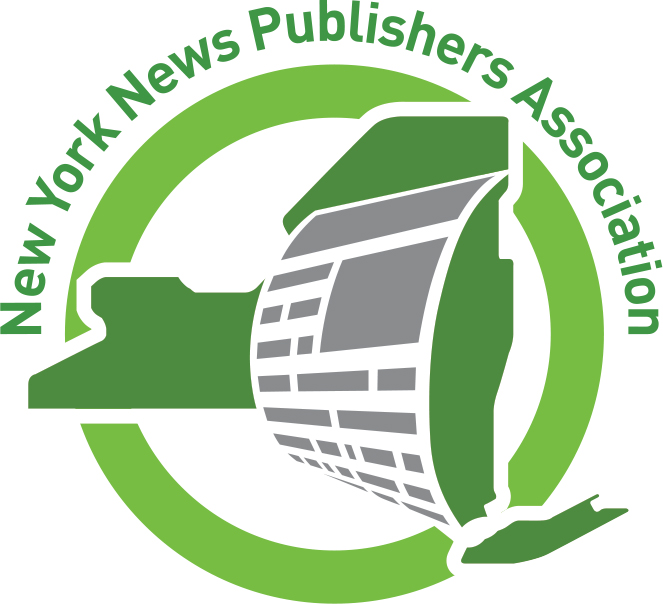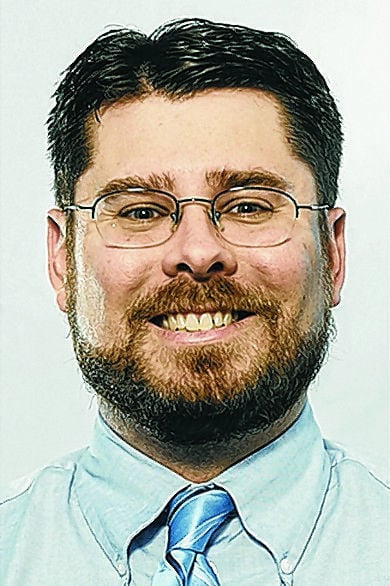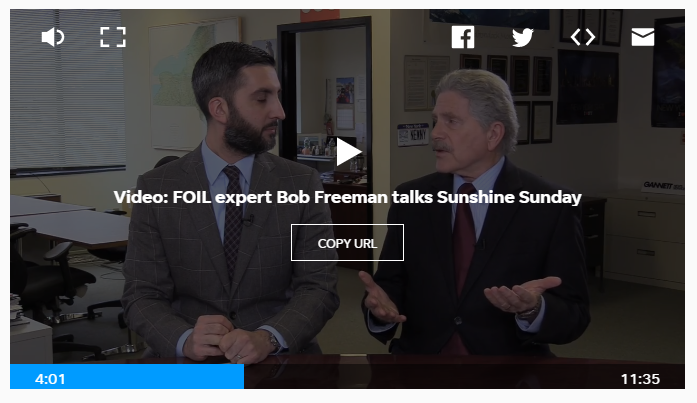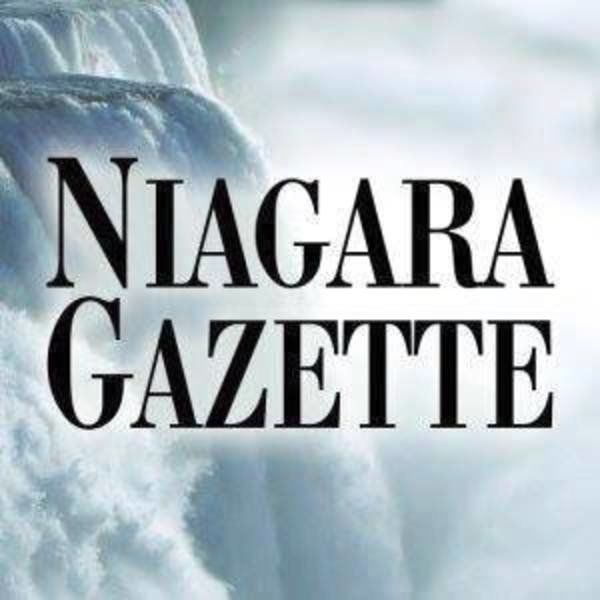|
New York News Publishers Association Home | About | News | Member Services | Advertising Services | NIE | Foundation | Contact Us |
|||
Sunshine Week 2018 - March 11-17
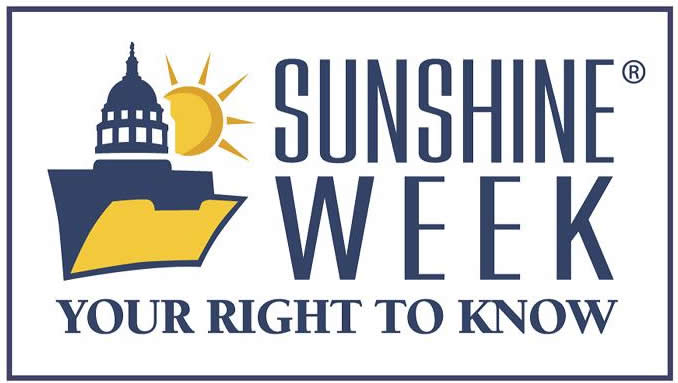
Sunshine Week is a national initiative to promote dialogue about the importance of open government and freedom of information. Participants include news media, civic groups, libraries, nonprofits, schools and all others interested in the public’s right to know. Sunshine Week seeks to enlighten and empower people to play an active role in their government at all levels, and to give them access to information that makes their lives better and their communities stronger.
The American Society of News Editors (ASNE) has collected and posted resources for educators and students for Sunshine Week. Visit their website at www.schooljournalism.org
Click here to access a set of graphic organizers and a list of web resources for teachers about Sunshine Week!
Below you'll find commentary and editorials about the importance of Freedom of Information. This content is available for all NYNPA member publications to reprint with attribution to increase public awareness of Sunshine Week and their right to know. Additional content will be added as it is received.
Committee on Open Government Department of State
|
Privacy: Where does it begin…or end?Many know that the New York Freedom of Information Law (FOIL) generally gives the public rights of access to records of state and local government agencies, with certain exceptions. My favorite exception states that an agency may withhold records to the extent that disclosure would result in “an unwarranted invasion of personal privacy.” That standard also appears in the federal FOI Act and numerous access laws in other states. When I offer a presentation, I often ask the crowd: “Unwarranted invasion of personal privacy….anyone know what that means?” Nobody raises a hand, and I say, “That’s ok. Nobody knows what it means, and nobody will ever know what it means. There isn’t a judge alive who can define that phrase any better than the average reasonable person.” Then I ask whether anyone has seen the Victoria’s Secret ads on tv, and a few people giggle, some sheepishly, but everyone admits to having seen the ads. Would those ads have run on network tv 25 years ago? Everyone says, emphatically, “No!” Well then, why do we see them today? Very simply, the sensibilities of society have changed and are constantly changing. What had been so intimate, highly personal, risqué or off color seems to be more acceptable today. Next, I ask whether anyone has kids, and whether they’re users of social media. Parents grimace, and I suggest that our kids share information about themselves with their peers that their parents would never share. There are generational differences in views about privacy. Young people, their parents and senior citizens have different notions about what is private and what isn’t. And this is my favorite: two equally reasonable people can look at the same items and disagree. I use my own life as an example. We used to have a joke in the house. If the phone rang after 9:00 p.m., it was either my mother-in-law, or a reporter who’d gotten kicked out of a meeting, seeking an opinion or a comment regarding a board’s compliance with law. My name, home address and home phone number (still a land line) are in the phone book and available online. Anyone can find me. My wife, on the other hand, uses a different name for good reason. First, she doesn’t want to be associated with me (completely understandable), and second, she’s a psychotherapist and doesn’t want clients to know where she lives, or her home phone number. She has perfectly valid reasons for saying, “No, never!” I have equally good reasons for saying, “I don’t care”, and never the twain shall meet. So what do we do about privacy? The courts have given us guidance. When records relate to a private individual, the state’s highest court has offered a standard: the reasonable person of ordinary sensibilities. What would a “reasonable person” feel about disclosure of a particular item? If that person believes that it’s one of those items that is nobody’s business, intimate or highly personal, it’s likely that the item can be withheld. However, if the item pertains to a public employee, the courts have repeatedly found that public employees have less privacy than others because they are supposed to be more accountable than others. If an item about a public employee relates to that person’s duties, usually the information is public because disclosure would result in a permissible (not an unwarranted) invasion of privacy. That’s the basis for your right to records indicating the salary, overtime payments, attendance, findings of misconduct, and similar items concerning public employees. I’m a public employee…and if you are not, I have less privacy than you! The point is that you have the right to know various details about me and others, those who are supposed to be your public servants. |
Executive Editor
|
Open records laws make a differenceFor me, there's a period of several weeks from mid-January into March that I think of as "awards season." No, I'm not talking about the entertainment industry's run of shows: Grammys, Oscars, Golden Globes, etc. I'm talking about a group of journalism contests for which we prepare entries around this time of year using stories, photos, videos and other content we've published the previous calendar year. The work of preparing entries is a bit tedious, but for me, there's certain reward in it — and I'm not referring to the actual awards we've been fortunate to win over the years. The reward personally comes from the chance to look back over a year of terrific journalism produced by the people who work at The Citizen and auburnpub.com. In the day-to-day rush, it's easy to lose track of the big-picture impact a good community newspaper has over the course of time. As I've put this year's entries together, something that jumped out at me was the number of important stories our staff broke using the state's Freedom of Information Law. FOIL, and the federal version now as the Freedom of Information Act (or FOIA), protects that vital premise that the public has a fundamental right to know what the government is doing. In the past year here, reporters have brought forth big stories using FOIL requests to get key documents. There was an investigative piece into an Aurelius fire in which county and state officials arrived at different conclusions. There was the series on a state Assemblyman's taxpayer-funded community liaison who had some questionable time-sheet entries, among other issues. There was the battle, requiring us to spend considerable money on a First Amendment attorney, to secure records from a county authority on a lease deal it made. I could rattle off about a half-dozen more stories from 2017 in which FOIL was indispensable in getting the information reported to our readers. I'm offering this summary in order to illustrate the importance of an annual nationwide awareness campaign about the importance of government transparency. Sunshine Week, organized by the American Society of News Editors and Reporters Committee for Freedom of the Press with support from the John S. and James L. Knight Foundation and The Gridiron Club and Foundation, kicks off Sunday, March 11, and runs through Saturday, March 17. Over the course of Sunshine Week, we'll provide editorial cartoons, special columns and a few news stories that will give readers some information to consider about the importance of open records and meetings. A great resource for everyone to check out is sunshineweek.org, and you might want to follow @sunshineweek on Twitter. In our state, another terrific tool is the New York Committee on Open Government site (dos.ny.gov/coog). Also check out the federal Office of Government Information Services (ogis.archives.gov). For our classrooms out there with an interest in Sunshine Week, I encourage you to check out the Newspapers in Education program page set up by the New York News Publishers Association: nynpa.com/nie/sunshine.html. There's some excellent materials there for talking with students about the importance of this issue. |
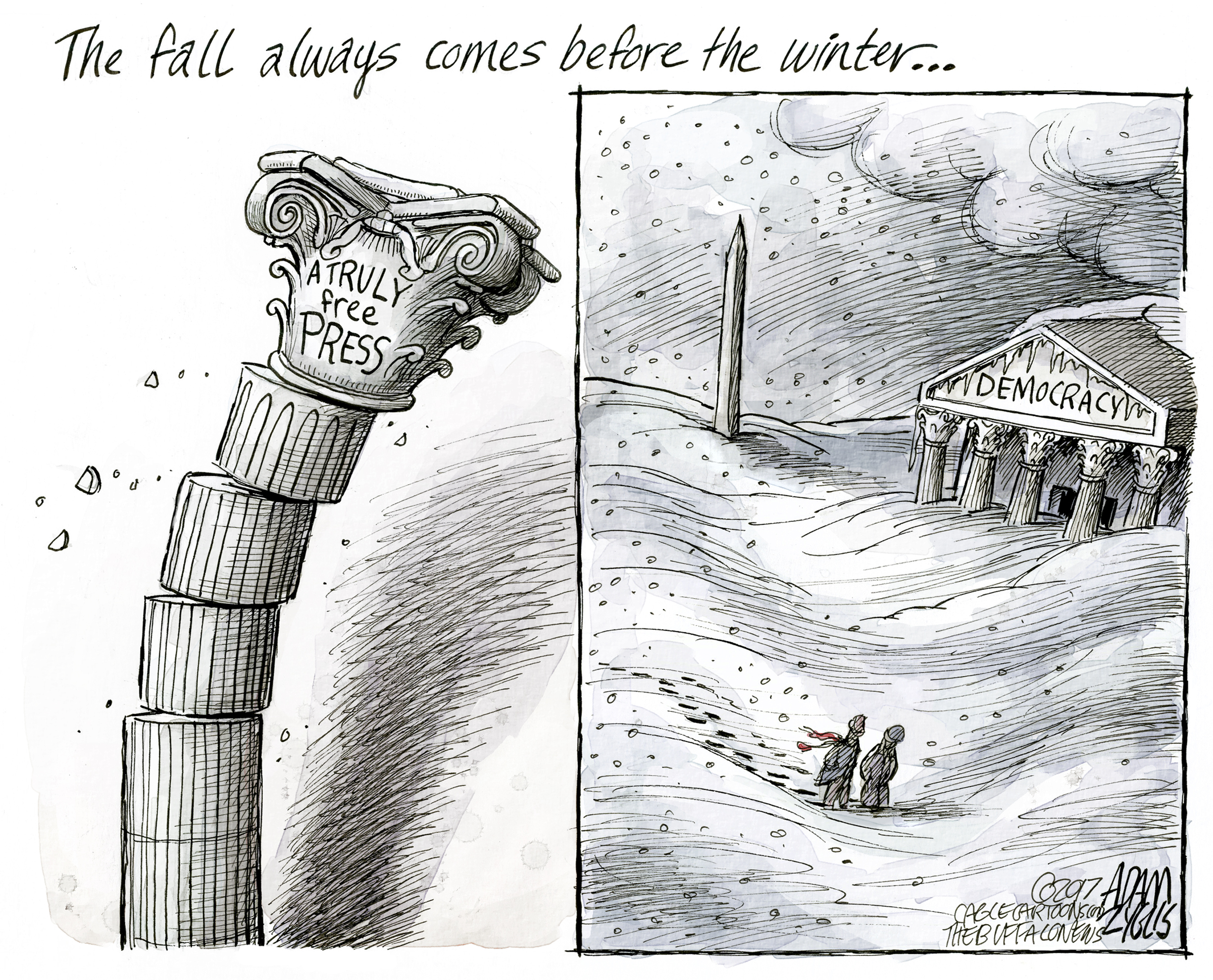
Editorial Page Editor
|
The fight for our right to know never endsYou’d think with all the new technology available at our fingertips, finding out information about our government’s activities these days would be easier than ever. But there are three main reasons why it appears to be getting more difficult, not less difficult, for citizens to monitor government activity and obtain information. Whereas once people could only communicate in person or on the phone and could easily be caught violating open meetings laws, now they can meet through encrypted cell phones, using personal phone numbers on password-protected electronic devices to communicate and share government information off the grid through email and text. Whereas once government bodies could be forced to demonstrate how they made decisions, such as why they chose to build a fire station in a particular location or how they determined which neighborhood sent its kids to a particular school, or how a court determined bail for a criminal suspect, those decisions are now made with the use of artificial intelligence. Government bodies are now basing decisions on the use of complex computer algorithms that are jealously protected trade secrets. The companies that produce these algorithms are being paid with taxpayer money and the decisions that are being made with their information are being executed with taxpayer money. Yet access to such information is heavily guarded from taxpayers. Yes, more government documents than ever are being put online. But increasingly, government business is being conducted not as much during regularly scheduled, well advertised public meetings, but in cyberspace, where it’s more difficult for reporters and the public to become aware of such meetings and to then find out what was actually said or done. Freedom of Information laws were originally designed to deal with paper records and personal meetings. But while the laws have been modified over time to deal with electronic records and communication, it’s difficult for them to keep up with the rapid changes in technology. The second reason access to government continues to be a challenge is that in the end, we’re still dealing with government officials. And nothing much has changed in the desire of some government officials to conduct the public’s business in secret in an effort to avoid scrutiny that might embarrass them, expose illicit conduct or cost them votes. In that area, nothing much has changed, really since the beginning of time. And now that government officials have better tools to avoid detection, the challenge to ensure transparency in government is greater than it’s ever been. A third reason why it’s becoming more difficult to learn about your government is that as electronic communication and equipment has become a bigger part of our lives, people are making greater efforts to retain and regain their privacy. Where once it would be relatively easy for a government official to keep his salary and compensation out of the public’s eye, citizens now can go online in an instant and find out exactly how much that person makes. Cameras, many set up by government, ostensibly for law enforcement purposes, capture our every move in public. When a journalist attempts to obtain footage from a street camera or a police officer’s body camera, the effort suddenly raises all sorts of privacy issues. We should be able to see police arrest a suspect or see someone doing a drug deal on a street corner. But should we also be able to see inside people’s homes during a police raid or view the image of a crime victim a police officer is interviewing or watch the camera footage of a husband leaving his home to cheat on his wife? More and more, the public is rebelling against the exposure of any personal information, which is often mingled with information that the public has a right to know. And legislators are supporting them, even when some of that information rightly belongs in the public domain. For journalists and many dedicated members of the public, this all presents an every-day challenge. But for most members of the public, this high-tech game of cat-and-mouse flies under their radar. That’s why each year, the journalism community celebrates what we call “Sunshine Week.” It’s one week a year in which we attempt to focus the public’s attention on the importance of maintaining an open government and the challenges we all face, journalists and regular citizens alike, in ensuring we know what’s going on. It’s a chance to remind citizens of their rights under the law and to remind public officials of their obligations. It’s a chance to shine the light on the great journalism that’s being conducted to expose government secrecy and malpractice. It’s an opportunity to share the viewpoints of those on the front lines of the open government fight, people like Robert Freeman, director of the state Committee on Open Government; Brett Orzechowski, author, educator and open government advocate; Pam Fine, Knight chair for News, Leadership and Community at the University of Kansas; and other experts in the field. The only way to keep government open is for all of us to demand it and to fight for it. |
The Post-Star
|
For Sunshine Week, let's honor the truthWhen it comes to finding out the truth of what is going on and reporting on it, which we consider our job, the challenge is different this year. In past years, we have marked the start of Sunshine Week by writing about obstacles to the collection of government information — mainly the failures of state, federal and local officials to abide by laws on freedom of information and open meetings. Those obstacles remain. Many government officials continue to flout their ignorance of or lack of concern for laws that require them to make public information available to the public and to conduct public business in public meetings. But we are facing even more daunting challenges this year — the rise of skepticism about the trustworthiness of the news media, the effort by politicians to delegitimize news operations for their own purposes and the use of falsehoods by the Trump administration to push its agenda. The lying by President Trump and the people who work for him falls into two broad categories: falsehoods about what happened and falsehoods about the reporting on what happened. So, in one of the administration’s first big lies, Press Secretary Sean Spicer asserted the crowd at President Trump’s inauguration was huge, even though it was smaller than at previous recent inaugurations; and then, when news outlets reported the truth, Trump officials said they were lying. It’s easy to dismiss this sort of lying as clumsy and obvious. But the lie created a touch of confusion — a sliver of doubt — and that was enough to encourage those who wanted to believe it. And the second lie — that the media reports were false — gave the believers a slogan: Fake News! Shouting “Fake News!” made people feel they were standing up for a cause — fighting the media that was forever trying to feed them stories they didn’t like. From that beginning about a year ago, we have continued down the dangerous path of replacing facts we don’t like with falsehoods we do. The roots of this flowering of falsehood stretch back to long before Donald Trump ran for president. He has simply been brilliant at capitalizing on the public’s craving to be told what they want to hear. We have seen local politicians copy this approach, and we have called them out on it — once with a front-page editorial. Thankfully, both of those politicians are no longer in office. The effect of all the half-truths and non-truths mixed in with a bit of truth here and there has been to make the work of journalists much harder. Reporters have always relied on trust to do their jobs — the trust of subjects that what they say will be accurately reported and the trust of readers that stories are factual and fair. The concept of the fourth estate is that the press serves as a counterbalance to traditional centers of power such as government and business. Its authority is derived from its credibility with readers, which is based on facts. So for Sunshine Week this year, rather than harping on access to government documents or the necessity of following the Open Meetings Law — both of which are important — we are going to make a plea for respect for evidence and truth. We have to hold onto our respect for facts and the truth and resist the temptation to believe only the stories that fit our biases. This year, it is the press itself that is under siege, but our country has never needed it more. |
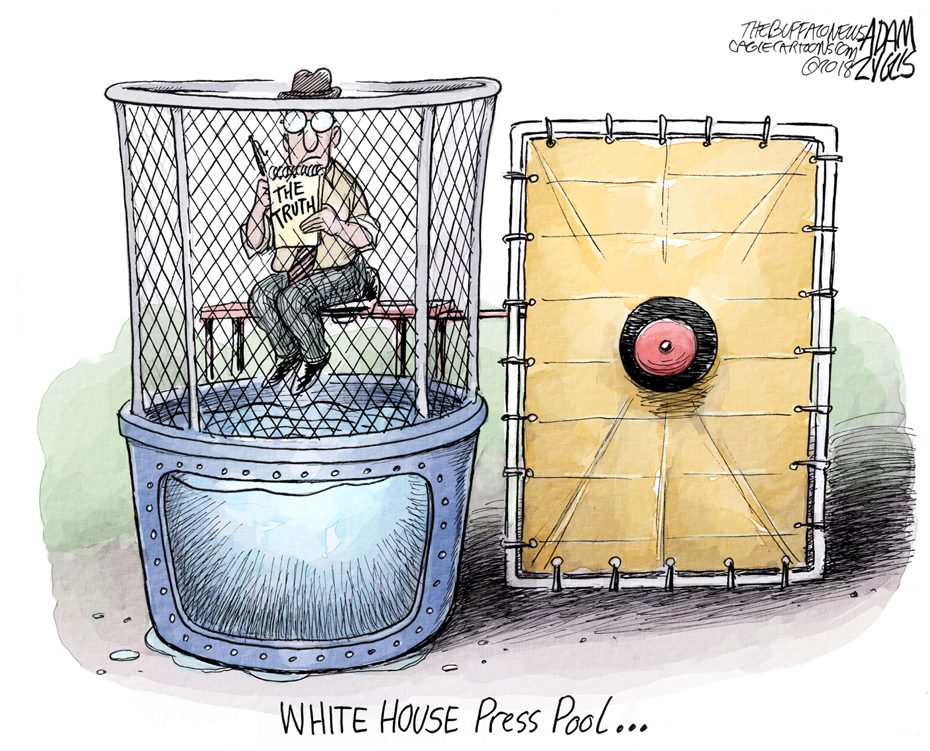
Poughkeepsie Journal Editorial Board
|
'Sunshine Week' must be more than a symbolic nodFor journalists and other backers of accountable government, this is tantamount to “Super Bowl Week.” It goes by the name of “Sunshine Week,” an excellent endeavor to put attention and pressure on government officials to keep meetings open and allow information to flow to the public. The weeklong effort is coordinated by the American Society of News Editors and the Reporters Committee for Freedom of the Press. But, in reality, these efforts are a daily grind for journalists and other members of the public who thirst for information -- and who demand their rightful access to documents and meetings. New York has two pillar provisions aiding in this fight: the state Open Meetings Law and the Freedom of Information Law. But, too often, the burden of proof falls on the public to articulate why documents should be released or a meeting should be open. That is completely and dangerously in reverse from how it should work. The responsibility must always be placed on government to explain, in detail, why the public is being denied access to information or a meeting. Occasionally, government officials will complain that journalists and the public at large are filing too many Freedom of Information Law (FOIL) requests, tying up valuable staff time to accommodate these demands. To that, we would say all public servants, whether they are sitting on school boards or municipal councils, should have it drilled into their heads that, in many instances, FOILs wouldn’t be necessary if the information were available to begin with -- as often ruled by the courts on appeal. Last year, Gov. Andrew Cuomo and state legislators did pass long-awaited legislation providing a powerful incentive for public agencies to act faster on such requests. They require agencies to pay a litigant’s legal fees if he or she has substantially prevailed in a FOIL case. Judges can rule for such judgments if they find the agency in question had no reasonable basis to deny access to the documents. But, too often, it takes years for such legislation to pass both the state Senate and Assembly and get signed by the governor into law. With a former aide on trial for allegedly accepting more than $300,000 in bribes from the businessmen who needed help with state business, this year the governor should surely see the need to broaden the reporting requirements for economic development money so these funds and their recipients are easier to track.
This week, politicians of all stripes undoubtedly will offer various “open government bills” for consideration. There likely will be a fair amount of grandstanding, but these bills will have to be carefully evaluated -- and the authors ought to be willing to articulate how their efforts will strengthen FOIL, the Open Meetings Law or otherwise lead to a more accountable government. “Sunshine Week” should be more than a symbolic nod to open government; it should be the impetus for actual change. To find out more about Sunshine Week, go to sunshineweek.org/ To find out more about the New York Committee on Open Government, go to www.dos.ny.gov/coog/ Opinion Engagement Editor John Penney wrote this editorial on behalf of The Poughkeepsie Journal Editorial Board. Email him at jpenney@gannett.com; follow him on Twitter at @johnpenneynews. |
Editorial Board of
|
Expand N.Y. law on people's right to knowAt the close of 2017, Gov. Andrew Cuomo signed a bill strengthening the state's Freedom of Information Law by allowing people to recoup their legal fees in cases where public documents have been illegally withheld by government agencies. Now is the time to move forward on some other advances on behalf of transparency. In recognition of Sunshine Week and the importance of access to public information, we join the chorus of good government groups calling on the state to expand the scope of FOIL to increase access to documents generated by the state Assembly and Senate as well as the state agencies charged with rooting out corruption. When New York's first FOIL legislation was passed more than 40 years ago, the Legislature made itself more or less immune to the law and retained the ability to keep most of its inner working out of the public eye. Likewise, the Joint Commission on Public Ethics and the Legislative Ethics Commission — charged with being watchdogs over public officials — are able to do their work with very little public scrutiny. New York's FOIL goes hand-in-hand with its Open Meetings Law in the sense that, with very few exceptions, the work of the government and its affiliated agencies should be open to the public. Decades of secrecy have helped a culture of corruption flourish in Albany. Things are getting better, but more remains to be done. Upon signing the FOIL reform last year, Cuomo pledged to "advance comprehensive FOIL reform in the next legislative session that applies equally to both branches of government." The Legislature should get to work this week on making that happen as well as adding FOIL to JCOPE and the LEC. And there is no reason those reforms can't be passed before the end of the current legislative session. The Citizen editorial board includes publisher Rob Forcey, executive editor Jeremy Boyer and managing editor Mike Dowd. |
Click here to view a video with Bob Freeman, the executive director of the state Committee on Open Government discussing the latest regarding the state's Freedom of Information laws with Gannett's Albany Bureau Chief, Joseph Spector. Recorded on Thursday, Feb. 22, 2018.
Editorial Board of
|
Stop hiding police abuseTHE ISSUE: A police union lawsuit seeks to block public release of body camera footage. THE STAKES: Will the Legislature finally fix a law that shields police — including the bad ones — from public accountability? The whole point of police body cameras is to make law enforcement more transparent and accountable. Now, though, a police union is suing to keep body cam footage from public view, and it could well win this fight for more secrecy — with the help of the New York Legislature.
The New York Police Department's Patrolmen's Benevolent Association argues the release of body cam footage violates officers' civil rights under section 50-a of the state's civil rights laws. That statute was originally intended to prevent criminal defense attorneys from prying into police officers' personnel records in order to try to impugn them in cross-examination. But it has been broadly interpreted by courts to prevent the release of virtually any records related to an officers' performance or discipline. The Capital Region is all too familiar with the absurdly broad immunity from public scrutiny this affords police. One of the key cases in the law's legal history concerned an egg-pelting incident involving 18 off-duty officers in Schenectady. In 1999, the Court of Appeals blocked the release of records in the case, citing 50-a. Courts have also applied the law to correction officers and firefighters. In the latest case, the PBA argues the NYPD's practice of releasing body cam footage of police shootings without consulting the officer or the union not only violates 50-a but disregards "the very serious safety, privacy, due process, and other interests of police officers, the subjects of recorded videos and their families, those investigating the conduct at issue, and regular people innocently captured on released footage." It's hard to believe the PBA is terribly concerned with "the subjects of recorded videos" — the people, that is, who are sometimes the victims of police abuse. It was a sustained national outcry over such abuses, particularly shootings and other killings of unarmed civilians in encounters with police, that helped fuel calls for police to wear body cameras. This case could well set further New York precedent. Former state Sen. Frank Padavan, the chief sponsor of the legislation, has said the law was never intended to be so broadly applied. The Legislature, however, has consistently refused to amend the law to limit its scope. It would be hard to blame courts for assuming the Legislature's inaction implies agreement with the rulings. Yet lawmakers can't ignore what this has brought New York to: a state of ever more secret police forces on which officers who break the rules — even kill people under questionable circumstances — are shielded from public scrutiny. Nor is the public entitled to know their discipline, or the reasons for not disciplining them. A Legislature cowed by public safety unions, though, can't hide its complicity in this secrecy. Lawmakers must restore the public's right to know how police wield the extraordinary power they're granted — before this latest case obliterates what little sunlight there is. |
By Benjamin Joe Contributor
|
Local group reports on open government during Sunshine WeekThe Buffalo Niagara Coalition for Open Government decided to celebrate Sunshine Week by releasing two different reports on the condition of websites overseen by local municipalities and public authorities. The websites were graded on factors like timely posting of meeting agendas and minutes, placement of Freedom of Information data on home pages and the availability of financial disclosure forms for elected officials online. “Last year, when we evaluated those 16 local governments, 90 percent received a failing grade. Only two received a passing grade,” coalition President Paul Wolf said. Wolf said the numbers improved slightly this year, with 10 local governments receiving failing grades. He believes the coalition's work in keeping track of public government's websites and availability of information may have played a role.
“We don’t want to put out reports to put out reports," Wolf said. "We want change to happen. That’s why we’re doing this. So, it’s good to see that some local governments are listening, trying. We hope there will be more progress.” The reports centered around “very basic things” according to Wolf, but Bob Freeman, the executive director for New York state's Committee on Open Government said, under the law, they are not required. “I’ve been in contact with Paul Wolf and I’ve had to suggest that what he wants and the law is different,” Freeman said. Freeman takes an example of the grade given for posting the meeting agenda online. He said municipalities are not required to even have an agenda, and to be graded for not having one posted is of questionable benefit. “There’s nothing magical about an agenda,” Freeman said. While this is true, the state open government committee has recommended legislation to require municipalities and authorities to post records online as part of its annual report in December 2017. Freeman said he supports the recommendation and stands behind the idea that, if practicable, records should be released to the public. “I think it’s good for society,” Freeman said. “If you can, you must.” Karen McMahon, who is running for the New York Assembly 146th District seat, said she supports the effort. “I think that government works best when people can trust the institutions,” McMahon said. “So, I commend this coalition for their work, and I hope the agencies and government bodies that got their scores, take it to heart.” Lewiston Town Supervisor Steve Broderick, who was reached for comment after the press conference, noted that while his municipality failed the report, it was about seven points closer to passing. He said recent changes in an effort to promote more public access to information in Lewiston were not made with the report in mind, but said the coalition's criticism was welcome. In any case, the town moved up to 10th place of the 16 local governments from 13th place a year ago.
“I’ll be honest with you, it wasn’t intentional, some of the stuff (we’ve done) is what some of the people who speak at our board meetings about that we’ve incorporated,” Broderick said, referring to recommendations made by the local group, the Lewiston Taxpayers Accountability & Action Alliance. “I’m glad they’re actually videotaping and putting them (recordings of board meetings) online." The town is also currently making arrangements to incorporate camera equipment into its board room. Broderick also said that the NotifyMe link that residents could sign on and then receive emails was something he thought should be implemented, though he said it could also be used in case of road closures as well. “We’re not trying to hide anything,” Broderick said. “There are some things, I think, the board should discuss in an open meeting before it’s provided on our website. Not everything, but some things I think should. Contracts, I think should be discussed in a board meeting before they’re put on the website. Not everything should be put on the website. The stuff that we can, we will be put on there… we’ll do our best, we’re not trying to hide from anybody.” For more information on the Buffalo Niagara Coalition for Open Government and to view the group's reports, visit www.nyopengov.org |
Please note: Previous Sunshine Week content is still available for download and use.
Click here to access the eight newspaper in education features created for 2012 (3 column x 8 inches) - an overview of NYS FOIL, Open Meetings, How to gain access to records and one freature on Freedom of Information and NYS Courts.
Click here to access the five-part series of features highlights just a few of the websites with reports and other data that may be of interest to students and the general public. Graphic organizers to accompany these features are also available here as PDF download. The topics included:
• What is “E-Government”? – A brief summary of our “Cyber Sunshine” focus
• Vehicle Safety – Highway Safety Data
• Food Safety – Restaurant Inspection Reports
• School Safety – Violence and Disruptive Incident Report
If you'd like to make a donation to the NYNPA Newspaper In Education program, simply press the Donation button below.
Your generous gift will be processed through the New York Newspapers Foundation's secure PayPal account.
New York News Publishers Association, Inc.
Phone/Fax (518) 449-1667 - Toll-free: (800) 777-1667
